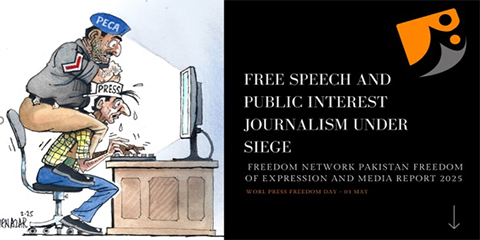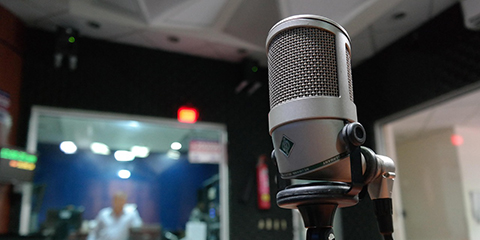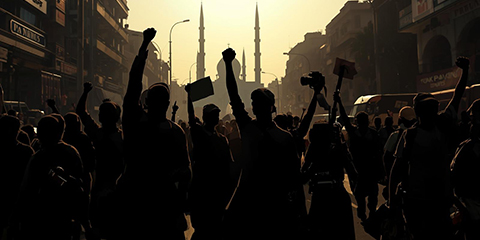Freedom of expression shrinks in Pakistan as PECA Amendments take toll: report
JournalismPakistan.com | Published 7 months ago | Media Release
Join our WhatsApp channel
ISLAMABAD—Pakistani media is standing at a crossroad amid an existential threat and increased restrictive environment, deteriorating safety and job security, significant challenges to professional integrity of media and its practitioners, according to Freedom Network’s annual Freedom of Expression and Media Freedom Report 2025.
Titled “Free speech and public interest journalism under siege,” the report finds that the existential crisis was triggered by amendments to Prevention of Electronic Crimes Act (PECA) in January 2025 that now “makes it easier” for authorities to arrest, fine and imprison journalists and dissidents – both offline and online – besides other challenges.
“The existential threat is serious as such a situation is seen rare in Pakistani media history. This situation is threatening the very foundation of democracy and the state is more brutal now than it was before to tolerate hard questions,” Freedom Network Executive Director Iqbal Khattak said as the report launch coincides with World Press Freedom Day being commemorated globally on 03 May, including Pakistan, every year.
Authored by Adnan Rehmat and Iqbal Khattak, the report provides an overview of the freedom of expression and media freedoms in Pakistan prevalent during May 2024-April 2025.
“These challenges reflect the broader shrinkage space for media freedoms in the country. Such a declining media space means citizens will have little access to information they need to know,” Iqbal Khattak said.
Five journalists were killed during the period this report covered. Three journalists were killed in Sindh province and two in Khyber Pakhtunkhwa province while at least 82 journalists and other media professionals had faced different types of threats during the same period.
Khyber Pakhtunkhwa emerged as the most dangerous province for journalists where 22 cases were documented while Islamabad recorded the second highest number of 20 cases against journalists and followed by Punjab – 18 cases. Four cases were recorded in Baluchistan and one in Azad Jammu and Kashmir.
The report said at least 14 journalists faced legal cases, mostly under PECA law while in eight cases journalists were arrested or detained in pursuance of legal cases.
Growing censorship, legal restrictions, violence against journalists, impact of disinformation on media and its practitioners’ integrity, challenges for women media practitioners, effects of political polarisation on media freedom and safety of journalists were key areas the report identified as main reasons for the current situation the freedom of expression and media freedom was faced with.
The women’s representation in Pakistani media has improved over the time, but significant disparities remained in the period under review, according to the report. “Even though inadequately represented in media in quantitative terms, women are active participation in various forms of media, including print, television, radio and digital platforms,” the report findings read.
It recommended “national movement to protect and pursue the constitutional guarantee of freedom of expression and the right to express dissent with policies and state action that impinge on the fundamental rights of citizen.”
The report also advocated for inclusion and engagement to mobilise public and civil society actors to make “the national movement” stronger and working.
A national consensus of key stakeholders for a new charter on digital rights of the citizens of Pakistan that “guarantees the same constitutional guarantees online as offline, and ensure internet access for all, quality internet and digital rights including the right to digital freedom of expression.”
اظہارِ رائے کی آزادی محدود، پیکا میں ترامیم سے میڈیا کو شدید دھچکا: رپورٹ
اسلام آباد — پاکستانی میڈیا ایک سنگین دوراہے پر کھڑا ہے، جہاں اسے وجودی خطرات، بڑھتی ہوئی پابندیوں، خراب ہوتی سلامتی اور روزگار کے تحفظ، اور پیشہ ورانہ دیانت داری کو شدید چیلنجز کا سامنا ہے۔ یہ انکشاف فریڈم نیٹ ورک کی سالانہ رپورٹ 2025 "اظہارِ رائے اور میڈیا کی آزادی" میں کیا گیا ہے۔
رپورٹ کا عنوان ہے: "آزاد اظہار اور عوامی مفاد کی صحافت محاصرے میں"۔ رپورٹ کے مطابق میڈیا کا یہ وجودی بحران جنوری 2025 میں پیکا میں کی گئی ترامیم سے شروع ہوا، جنہوں نے حکام کو آن لائن اور آف لائن صحافیوں اور اختلاف رائے رکھنے والوں کو گرفتار کرنے، جرمانہ عائد کرنے اور قید کرنے میں آسانی فراہم کر دی ہے۔
فریڈم نیٹ ورک کے ایگزیکٹو ڈائریکٹر اقبال خٹک نے رپورٹ کی رونمائی کے موقع پر کہا، "یہ ایک سنجیدہ وجودی خطرہ ہے، ایسی صورتحال پاکستانی میڈیا کی تاریخ میں شاذ و نادر ہی دیکھی گئی ہے۔ یہ صورتحال جمہوریت کی بنیادوں کو ہلا رہی ہے، اور ریاست اب تنقید برداشت کرنے میں پہلے سے زیادہ سخت ہو چکی ہے۔" رپورٹ کی رونمائی ہر سال 03 مئی کو منائے جانے والے ورلڈ پریس فریڈم ڈے کے موقع پر کی گئی۔
ادنان رحمت اور اقبال خٹک کی تحریر کردہ اس رپورٹ میں مئی 2024 سے اپریل 2025 کے دوران پاکستان میں اظہارِ رائے اور میڈیا کی آزادی کا جائزہ لیا گیا ہے۔
اقبال خٹک کے مطابق: "یہ چیلنجز ملک میں مجموعی طور پر میڈیا کی آزادیوں کے لیے سکڑتی ہوئی جگہ کو ظاہر کرتے ہیں۔ اس کا مطلب یہ ہے کہ شہریوں کو وہ معلومات دستیاب نہیں ہوں گی جنہیں جاننا ان کا حق ہے۔"
رپورٹ کے مطابق اس عرصے میں پانچ صحافی قتل ہوئے — تین سندھ میں اور دو خیبر پختونخوا میں۔ اس کے علاوہ کم از کم 82 صحافیوں اور میڈیا سے وابستہ افراد کو مختلف قسم کے خطرات کا سامنا کرنا پڑا۔
خیبر پختونخوا صحافیوں کے لیے سب سے خطرناک صوبہ ثابت ہوا جہاں 22 کیسز رپورٹ ہوئے، اسلام آباد میں 20، پنجاب میں 18، بلوچستان میں 4 اور آزاد جموں و کشمیر میں ایک کیس رپورٹ ہوا۔
کم از کم 14 صحافیوں پر قانونی مقدمات درج کیے گئے، جن میں سے اکثریت پیکا قانون کے تحت تھے، جبکہ 8 صحافیوں کو گرفتار یا حراست میں لیا گیا۔
رپورٹ نے میڈیا پر بڑھتی ہوئی سنسرشپ، قانونی پابندیاں، صحافیوں پر تشدد، جھوٹی معلومات کے اثرات، خواتین صحافیوں کو درپیش مسائل، سیاسی پولرائزیشن جیسے عوامل کو میڈیا کی موجودہ ابتر صورتحال کی بنیادی وجوہات قرار دیا۔
خواتین کی میڈیا میں نمائندگی اگرچہ وقت کے ساتھ بہتر ہوئی ہے، لیکن اس مدت کے دوران اب بھی نمایاں فرق موجود ہے۔ رپورٹ کے مطابق: "میڈیا میں تعداد کے لحاظ سے نمائندگی کم ہونے کے باوجود خواتین پرنٹ، ٹی وی، ریڈیو اور ڈیجیٹل پلیٹ فارمز میں فعال کردار ادا کر رہی ہیں۔"
رپورٹ نے تجویز دی کہ اظہارِ رائے کے آئینی حق اور پالیسیوں و ریاستی اقدامات سے اختلاف کے حق کو محفوظ بنانے کے لیے ایک قومی تحریک چلانے کی ضرورت ہے۔
اس کے علاوہ رپورٹ نے عوامی شمولیت اور سول سوسائٹی کی شرکت پر زور دیا تاکہ "قومی تحریک" کو مؤثر اور مضبوط بنایا جا سکے۔
آخر میں رپورٹ میں ایک نئے چارٹر آف ڈیجیٹل رائٹس کی ضرورت پر زور دیا گیا، جو یہ ضمانت دے کہ آن لائن آزادیٔ اظہار کو وہی آئینی تحفظ حاصل ہو جو آف لائن موجود ہے، اور تمام شہریوں کو معیاری انٹرنیٹ، مکمل رسائی اور ڈیجیٹل آزادی حاصل ہو۔

























